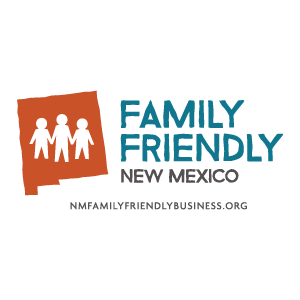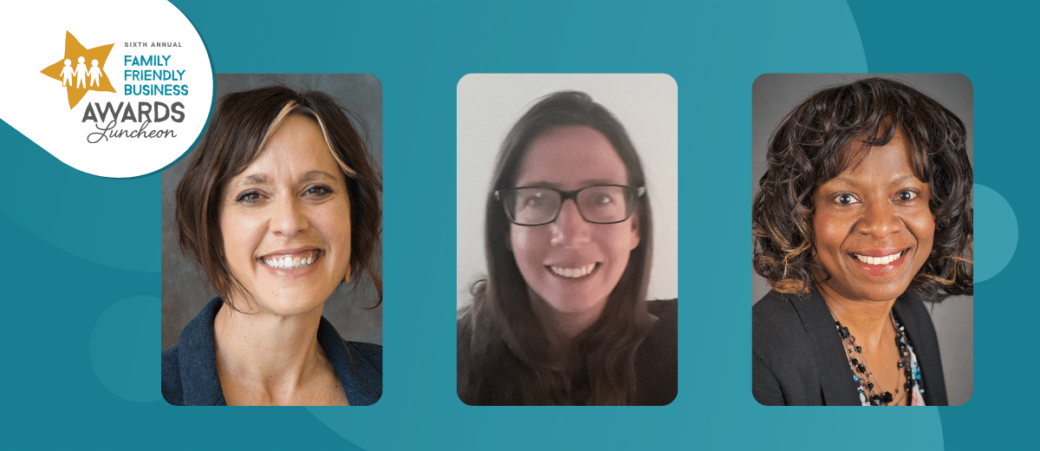The future of workplace culture was the focus of a panel discussion during the 6th Annual Family Friendly Business Awards Luncheon. The panelist brought so many thoughtful responses we wanted to continue this conversation as a blog post and offer the insight shared as a resource.
– Panelists –
 Dr. Gena Jones
Dr. Gena Jones
Assistant Vice President/Chief HR Officer
New Mexico State University
Dr. Jones has worked in the areas of Human Resources, Management and Supervision for over 30 years in both the private and public sectors; nineteen of which have been in executive leadership positions. She is certified as a Senior HR Professional from both HR Certification Institute (HRCI) and the National Society for Human Resource Management (SHRM).
Dr. Erica Barreiro
Future of Work Strategist
Central New Mexico Community College (CNM)
Acts as a primary advisor, leader and contributor to an agile, adaptive, and future-forward college direction. She also serves as a Practical Futures Advisor with SocialTech.ai, an organization focused on using practical futures methodologies and innovative social technologies to maximize and scale opportunities for working learners and employers.
Suzie Benton
Human Resources Director
Taos Ski Valley
Northern New Mexico, small and local business supporter. Focusing on connections to family, land and the environment.
The questions posed and each panelist’s answers are provided.
There have been radical shifts in the workplace due to the pandemic, more than half of all U.S. workers think about leaving their occupations. How are you or your organization/company rethinking how the foundation of work is designed and supported?
SUZIE BENTON: One of the big hurdles we have had is with communication. While our benefits are best in class, the pandemic made many of our departments feel siloed and in-person communication was limited. We had to find new ways for our staff to be educated about benefits. We implemented a new HRIS, rolled out an improved staff newsletter, and improved the training our managers receive so they were better able to share benefits information.
DR. BARREIRO: I think like many organizations, we are looking at how we design and support work that is hybrid and flexible. This requires new investments in technologies and training, as well as being able to clearly define service level agreements for departments and performance outcomes for each role. The shift to remote/hybrid work options has also challenged many of our practices around creating culture and community and we’re trying to figure out how we do this effectively in this new work environment.
I also think a foundation of work that we see emerging is designing and supporting the career arc of all employees. It remains true that a large percentage of employees in general find it easier to advance by going to another organization, and we know that one of the emerging priorities for weighing a job with a particular company is what they do to develop their employees.
DR. JONES: Indeed, the pandemic has caused a shift in the foundation of the work environment. Particular significance has been put on how and where work is performed. Before the pandemic, New Mexico State University (NMSU) was piloting a telework program. Since the pandemic, telework has become a regular and natural contributor to the effective and efficient work performed at NMSU. In speaking from a global perspective, however, hybrid and remote work opportunities give employees flexibility and, in some cases, create challenges in maintaining employee social connections and sustaining the foundational values of the organizational culture.
Additionally, there have certainly been employee recruitment and retention challenges, so we are intentionally focusing on the employee experience and work climate. To that end, increased efforts on equity, inclusion, diversity, enhanced opportunities for professional development, creating a culture of community, support, and appreciation, and seeking to strike a balance between employee life needs and organizational achievement are at the front of our strategic roadmap.
In today’s market, finding ways to achieve equity and inclusion will pay off in sustainability and growth for companies, benefits for society, and expanding economic prosperity for all. What priority do you/your organization place on DEI policy implementation? And what is one specific policy you have implemented? e.g., making hiring data public, analyzing retention numbers, diversity goals met for staff/board, public actions from leadership (not just a written statement) etc
SUZIE BENTON: Our annual pay equity analysis has allowed us to address any gaps in pay for staff that are performing the same work at the same level. Every time we increase our base compensation to match the MIT living wage, we use a compression schedule to make sure the increase is equitable to staff that have earned a higher wage due to professional development and experience.
DR. BARREIRO: DEI has always been important to CNM because of the student population we serve. But we have not had a specific position or office that has been responsible for developing related policy, processes, and practices. However, President Hartzler has made this a priority and I’m excited to share that we are currently in the process of hiring an Executive Director of DE&I who will report directly to the President and work with a new DE&I Leadership Team to help our college advance its goals for DE&I.
DR. JONES: Diversity, Equity and Inclusion play a significant role in the NMSU community, as evidenced by the university’s hire of the first Vice President for Equity, Inclusion and Diversity. Instituting this position was a tangible action demonstrating the university’s commitment to DEI. Regarding policy efforts towards DEI initiatives, NMSU has various policies and processes in place toward that end; in the hiring processes, a statement regarding diversity efforts in faculty promotion processes, gender and equity statement of principles, paired with non-discrimination policies. We are excited about the campus involvement, collaboration, and outcomes that will unfold out of this vital work.
How are you normalizing employee support and flexibility, encouraging a company culture that allows employees to form healthy boundaries around work time availability?
SUZIE BENTON: We have a robust benefits program that includes employee housing, a comprehensive employee assistance program, and employer-paid accident insurance for our seasonal staff members. Camber Outdoors (a non-profit partner dedicated to DEI in the outdoor industry) has helped us develop great DEI training for our hiring managers and senior leadership and give us insight into benefits and benefits communication through surveys. The high engagement of our staff this last season reflects the time and care we have taken to create this environment.
DR. BARREIRO: We have a lot more employees who are working schedules that allow them to organize their work time around family responsibilities such as picking children up from school mid-afternoon and working remotely on a day their child is sick. As someone with a medical condition and disability I have the option to seek these types of flexible work accommodations, but I really appreciate not having to be an exception to the general rule. The pandemic normalized flexible work arrangements in a way that has reduced the stigma of needing/wanting them. I even know of one supervisor who is here today who has been flexible with in-person requirements for an employee who is caring for a very sick pet.
During the pandemic, we realized that while working remotely allowed the blurring of work and life in ways that was beneficial to many employees, it also exacerbated the sense of feeling like you always had to be “on” for work—responding to emails is a classic example. One of the practices we’ve implemented is creating and communicating expectations around sending and responding to emails outside “standard” business hours.
DR. JONES: Flextime, telework and hybrid work models are a few options eligible employees have at NMSU, all of which assist in helping employees to maintain healthy work and life experiences. The pandemic has taught us that the cosmetic blend or reaching the “sweet spot” in assisting employees in balancing life and work should be a priority for all leaders.
Can you describe the impact of the Family Friendly Business Award® on you and your company as you work at creating the future of workplace culture to continue to promote work-life balance and equity in the workplace?
SUZIE BENTON: We began our journey with this award as a gold winner and are so proud to be a platinum winner for the last 3 years. This award helps us to consistently reevaluate what it means to be family friendly in an ever-changing world and reinforces our commitment to do the right thing for our staff members and our community.
DR. BARREIRO: The process of applying for the award validates the best practices we are currently engaged in and helps us identify opportunities for growth. I also see that when we design our workplaces to be family-friendly through strategies that promote work-life balance and equity for employees who are primary caregivers for family, we benefit all employees.
DR. JONES: The Family Friendly Business Award has not been just another award but rather has been an opportunity for NMSU as an employer to acknowledge the support, appreciation, and recognition provided to our employees. More importantly, it has given us increased knowledge of additional opportunities to support our employees.
It is not often clear how the various individual, organizational policies truly impact employees. Participating in the Family Friendly Business Award program allows that impact to become tangible and offers a platter of opportunities for organizational growth regarding family-friendly policy development in the application process and through the workshops, panel discussions, and group discussions provided as a participant in the program. All of which have assisted in identifying opportunities to improve the employee experience in our work environment and the institutional work climate through policy and practice.
As an HR professional, I am pleased to see how the focus, appreciation, and recognition of family-friendly work policies have positively impacted the work environment of organizations across the State.



